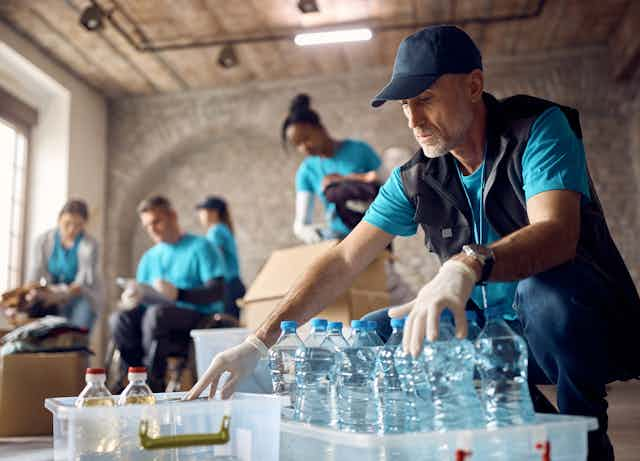The heavy rainfall that hit Libya during Storm Daniel caused two dams and four bridges to collapse in the coastal city of Derna, submerging most of the city in floodwater and claiming thousands of lives.
As you watch the disturbing scenes of this disaster on the news, you might wonder about the best way to help. Sending that blanket in the closet you have never used or those painkillers in the cabinet you overbought last time you had a headache might seem helpful.
But research suggests otherwise. Such “in-kind donations” (physical items such as food, clothing, household items and medicine) can actually place a heavy burden on the humanitarian aid network.
If items are delivered to disaster areas in bulk, humanitarian organisations can struggle to receive, sort and send them to people in need quickly. Any accumulation can clog critical airports and warehouses.
This is known as “material convergence”. Humanitarian organisations can become overwhelmed with unsolicited donations.
This can range from medicine and food (sometimes at or near expiry), to equipment that’s just not compatible with the country’s systems – whether that’s because of voltage differences or product labels written in a different language.
To avoid such backlogs, research shows donating money in cash or via bank transfer to verified international humanitarian organisations is the most helpful and efficient response to humanitarian crises. Within the past decade, some organisations have even launched successful cash and voucher assistance programmes to pass this money on to people in dire need.
Giving cash rather than in-kind donations also respects the dignity of beneficiaries, and prevents duplication and delivery of unneeded aid. Also, perhaps most importantly, it helps to support a local economy that might be crippled by crisis.
Cash-based interventions safeguard people’s purchasing power and help them cover urgent needs during crises, according to the Word Food Programme (WFP). This isn’t as simple with in-kind donations.
Delivering humanitarian aid to Derna
The recent flooding in Libya has left the city of Derna in dire need of such support for its people and its local economy. But even before the floods, the area has been crippled by civil conflict for more than a decade.
Libya is divided into zones ruled by different militias and two governments on the east and west of the country. There is constant fighting between the various factions.
The country already suffers from weak economic growth. Its GDP per capita dropped by 50% between 2011 and 2020 due to this conflict, despite Libya being among the top 10 global sources of proven oil and natural gas reserves.
Storm Daniel had already hit Greece, Bulgaria and Turkey before it was forecast to cause heavy rainfalls in Libya. But the country’s fragile economic and political environment and lack of national climate change strategy left it far from prepared for this disaster.
Worse, Derna is a neglected city in eastern Libya controlled by a rival administration to the western government. The region’s government does not allow free access of humanitarian organisations to Derna so it’s unclear if much-needed aid is reaching the right people and being distributed equally. But this political status has also created other complications for the current situation.
The city’s two now-collapsed dams have not been maintained for more than two decades, despite erosion concerns. Also, a functional meteorological service could have saved thousands of lives by issuing an early evacuation warning, according to the head of World Meteorological Organization (WMO).
After years of conflict, reports say the only hospital serving Derna’s 100,000 residents was a five-bedroom villa. Road and telecommunication infrastructure has also been weakened, while new road renovation and construction projects have been suspended due to security concerns. The port of Derna was also closed due to security issues for about three years until 2021, affected the local economy.

The compounding effect of concurrent disasters
When disasters happen in a setting already hit by other crises, there is a compounding effect. This means a disaster can have a higher detrimental impact on the livelihood of the people and the local economy. Responding to concurrent disasters is more challenging and can require more resources from humanitarian organisations.
The likes of the International Committee of Red Cross (ICRC) are no strangers to delivering humanitarian aid to remote or troubled areas, of course. Their supply chains are designed in a fundamentally different way from commercial supply chains. They are typically decentralised to allow swift decision making and the mobilisation of resources as required.
The Red Cross and other humanitarian organisations such as WFP, which runs the UN Humanitarian Response Depot also keep essential items “prepositioned” in strategic locations so they can be dispatched to disaster areas as a first emergency response.
The compounding effect of prolonged civil conflict makes delivering humanitarian aid challenging, but climate change is adding another layer of complexity to such situations. Of the 20 countries most vulnerable to climate change, most are dealing with armed conflict.
By 2050, humanitarian organisations will need to deliver aid to 200 million people – almost double current needs. Much of this aid will go to people hit by concurrent disasters, making delivery challenging, slow and arduous.
So, when donating in the wake of a disaster, consider giving cash to a reputable aid organisation. Research shows it has the best chance of getting to the heart of the crisis.

